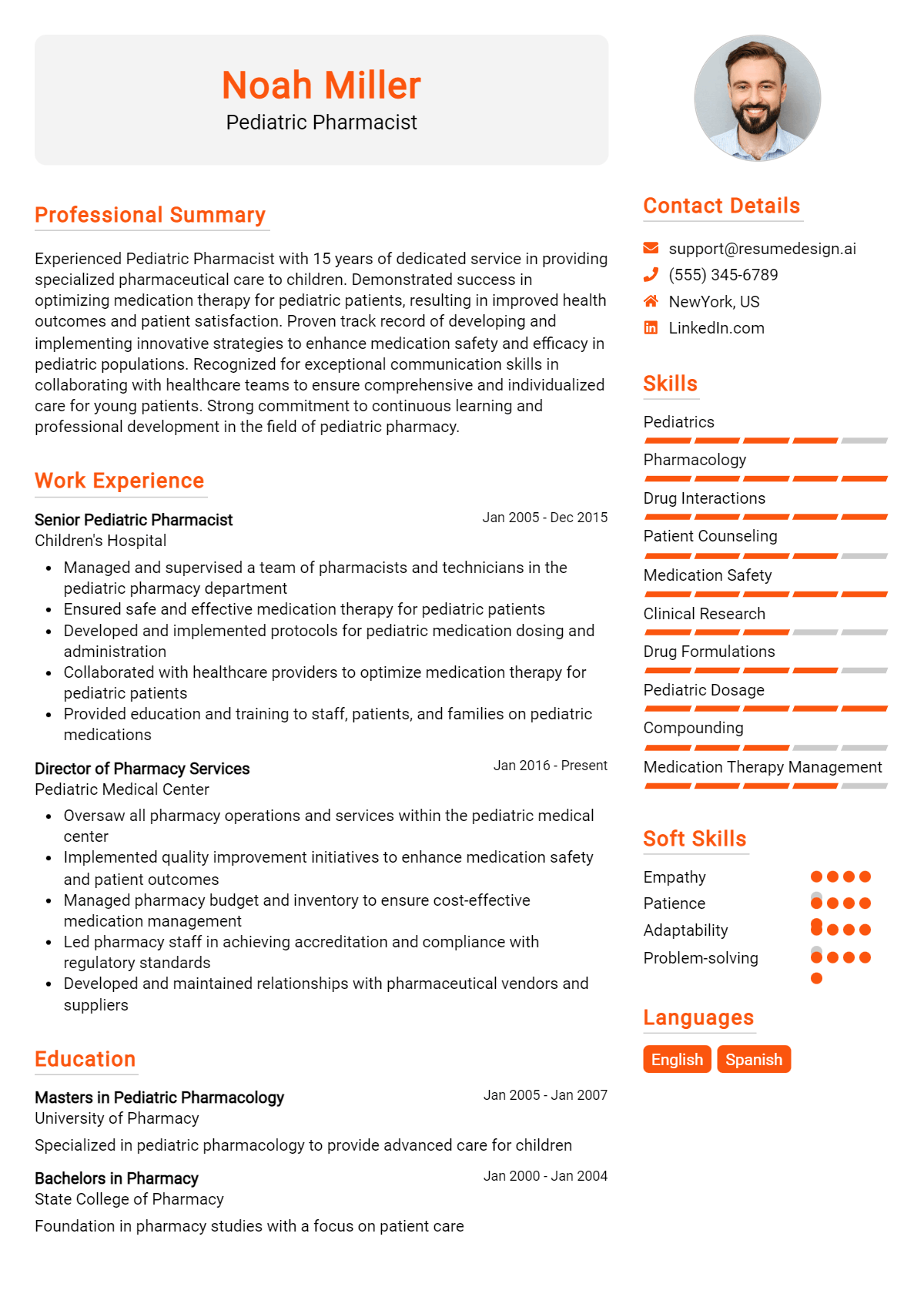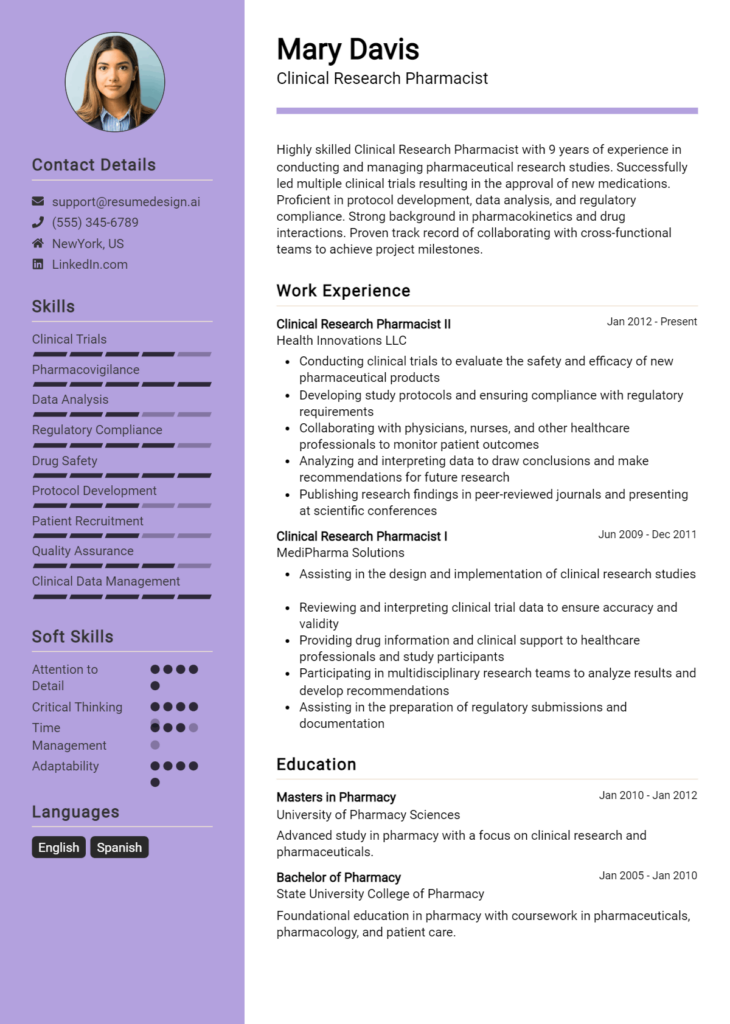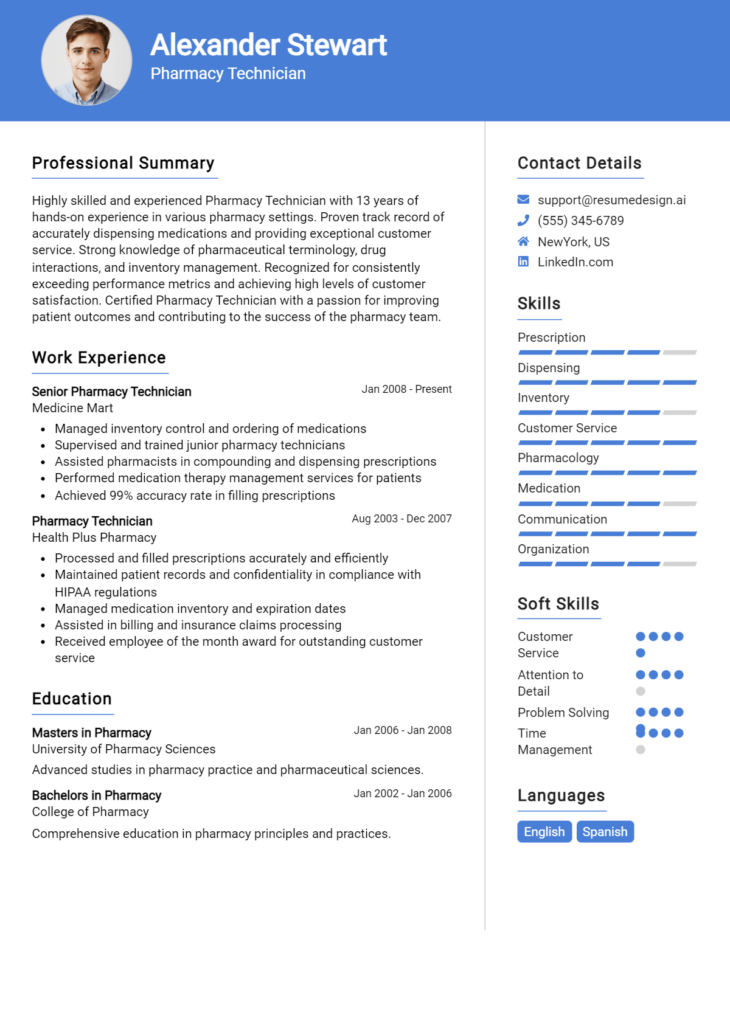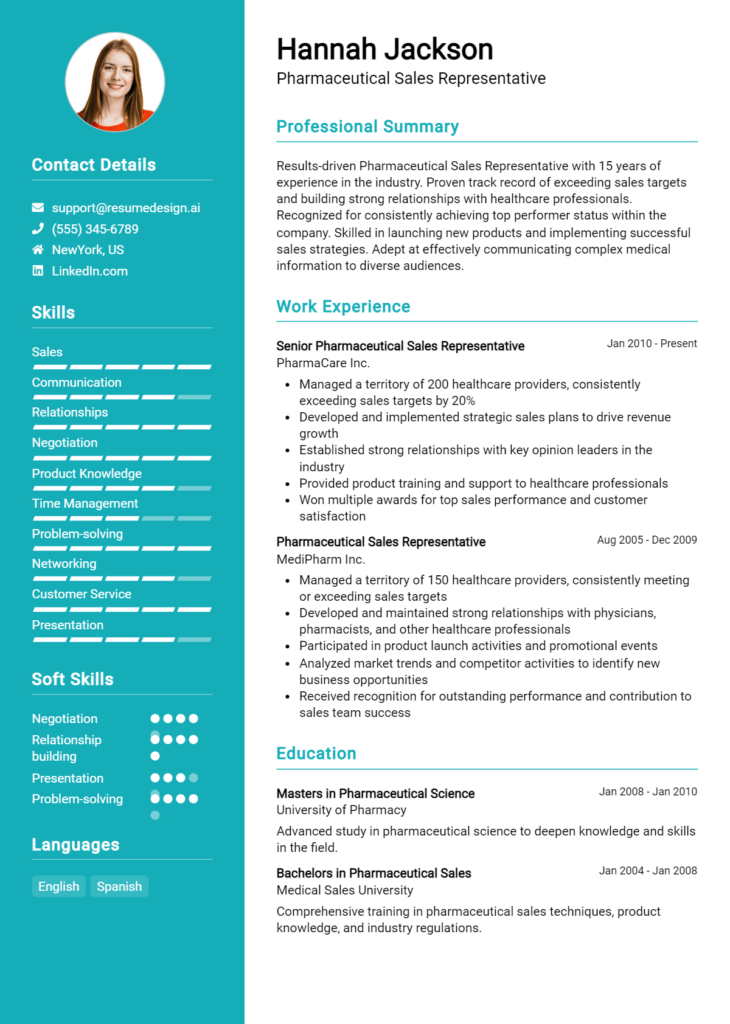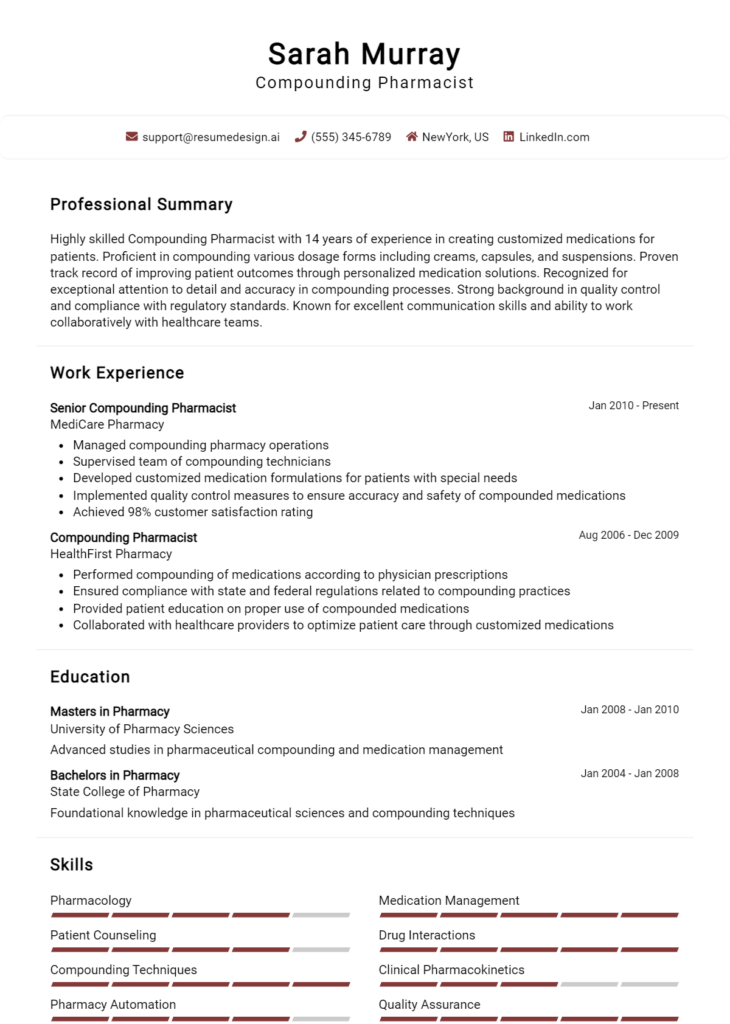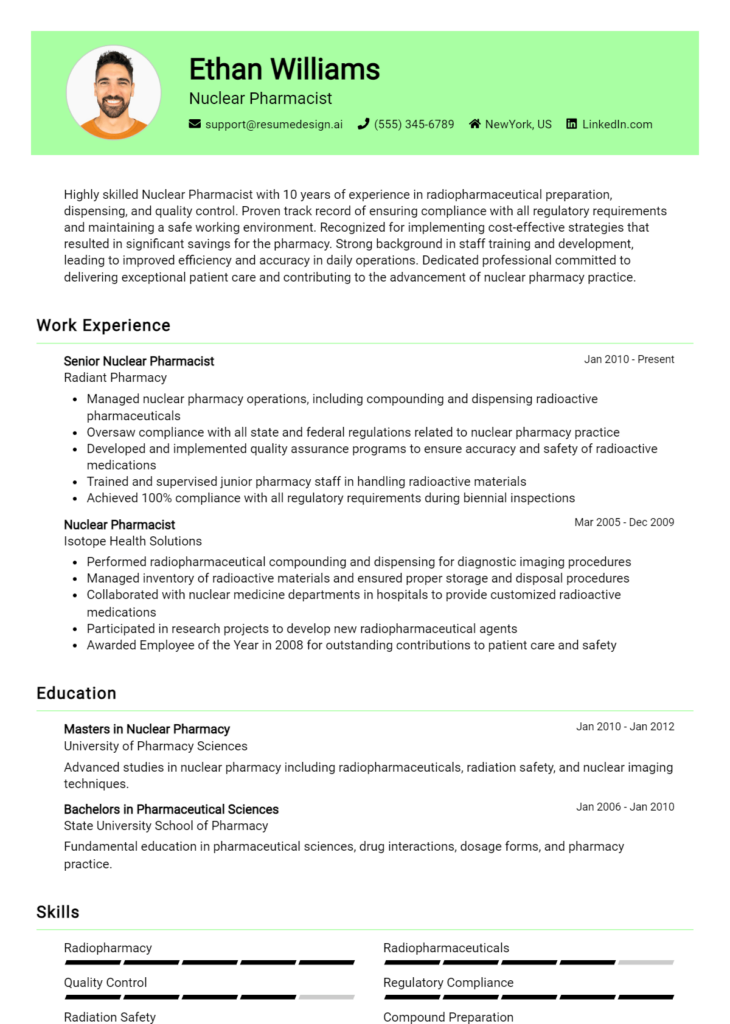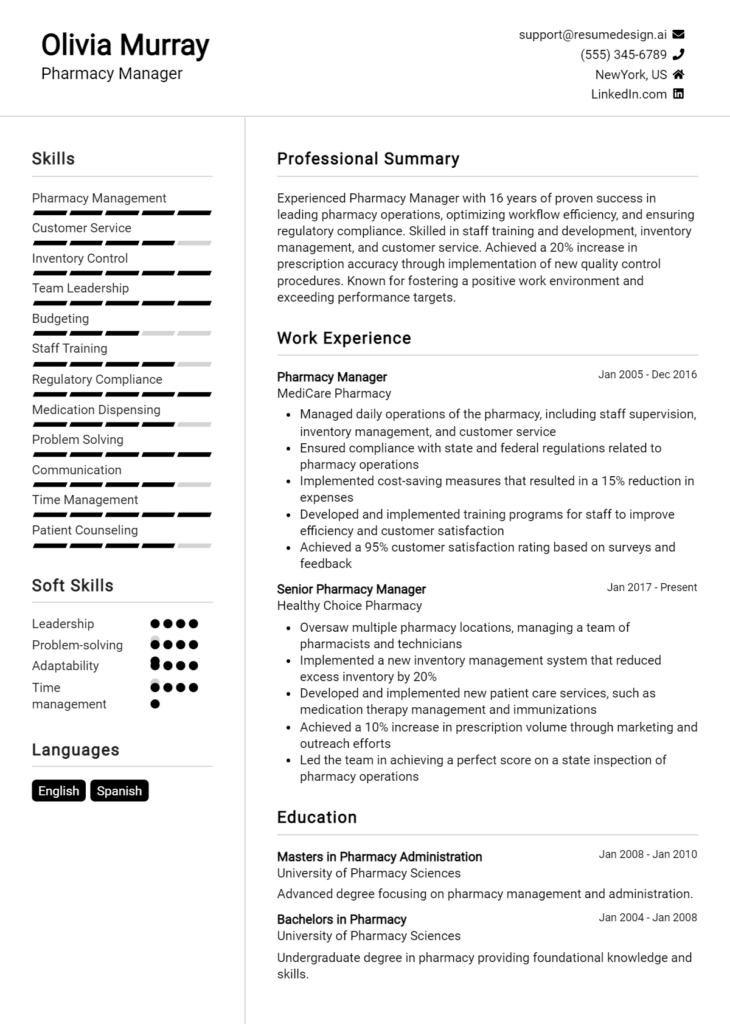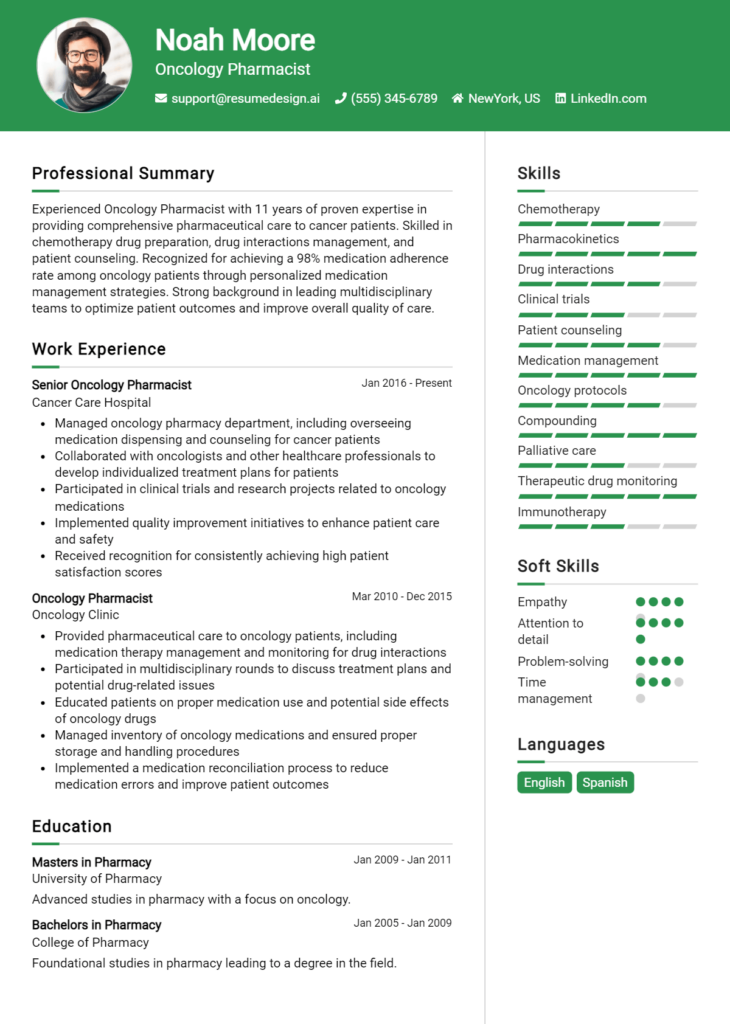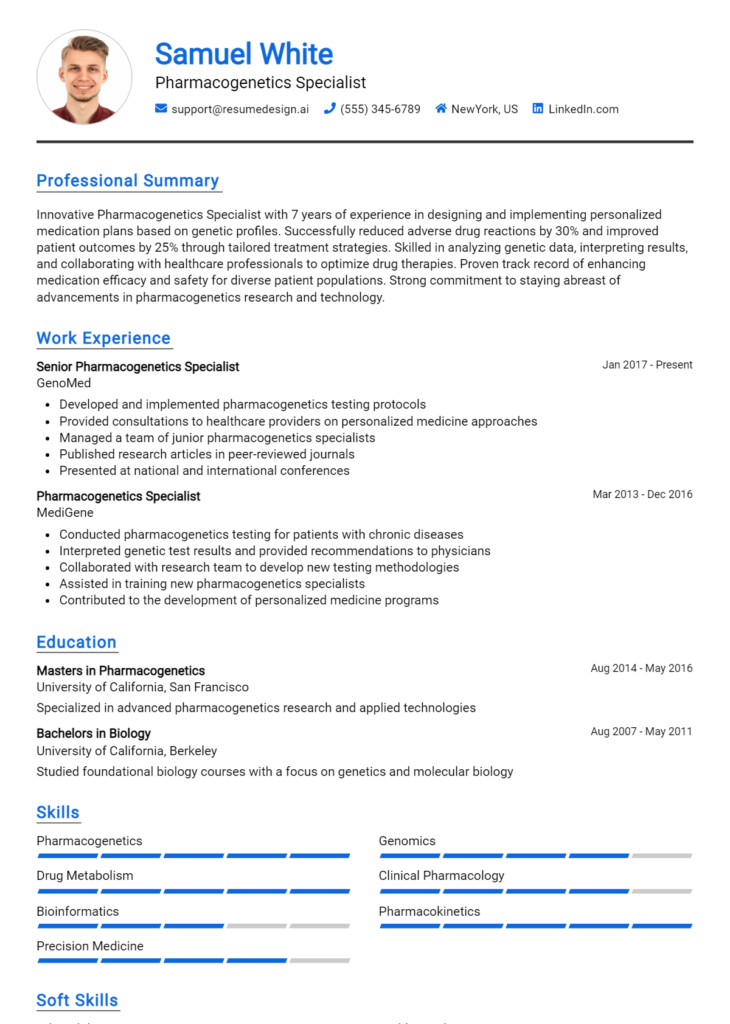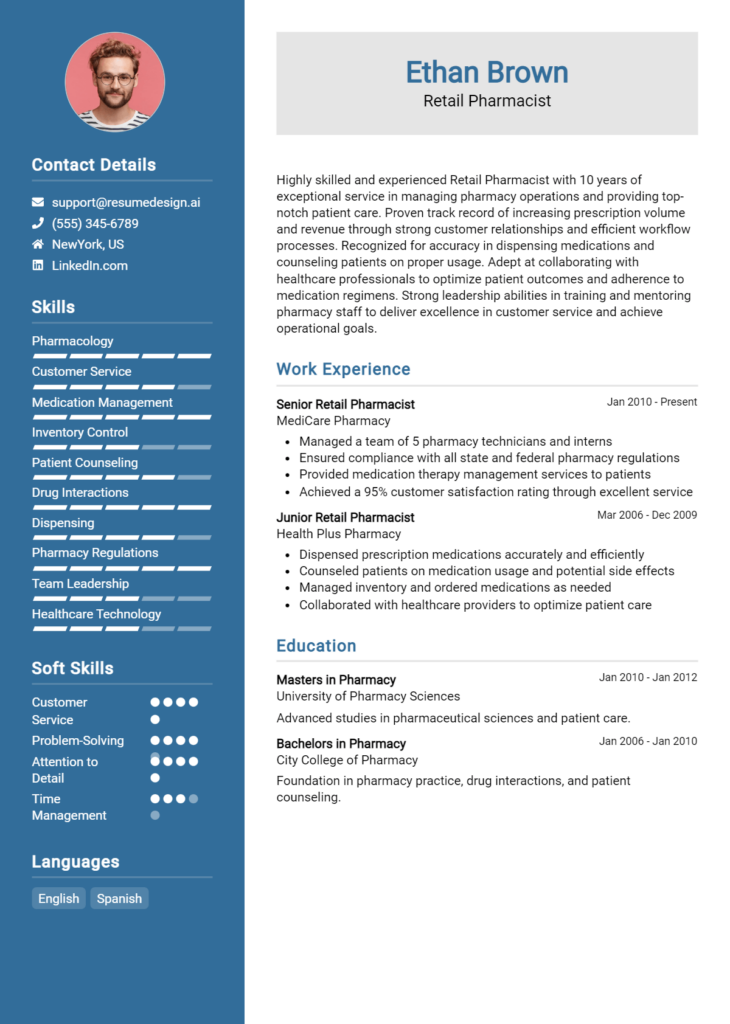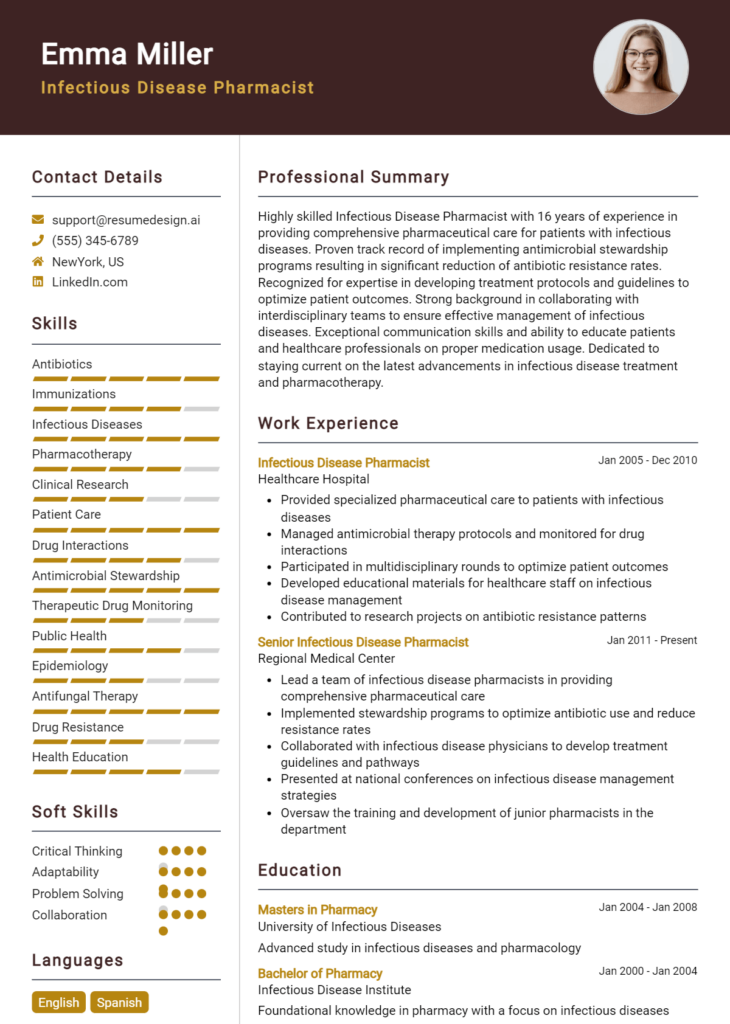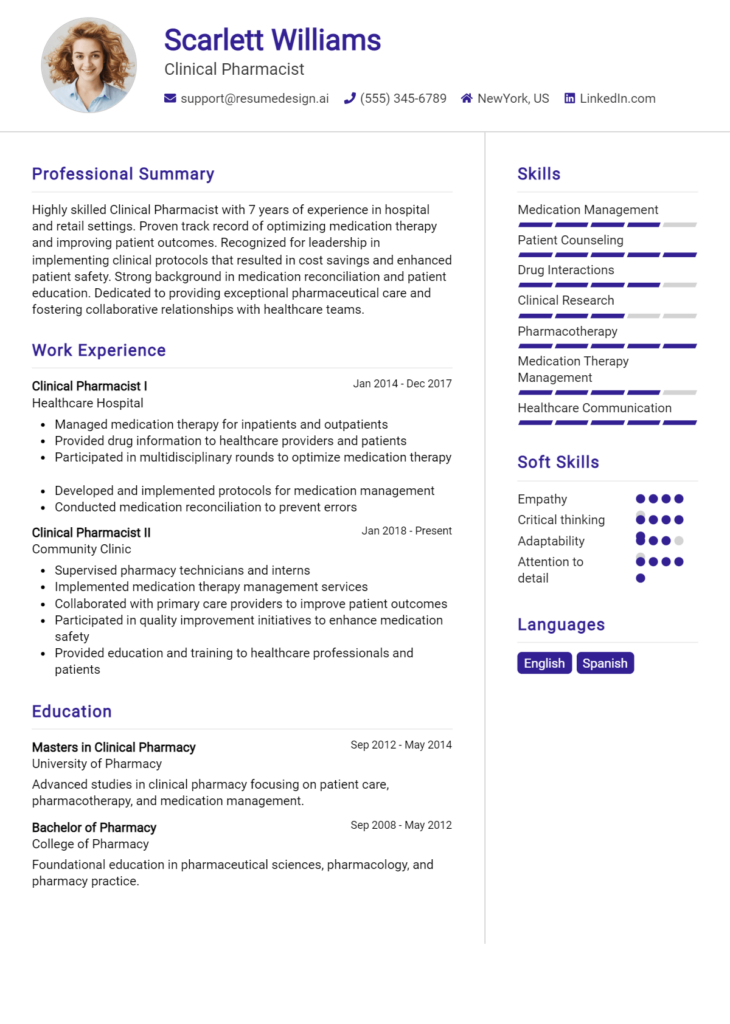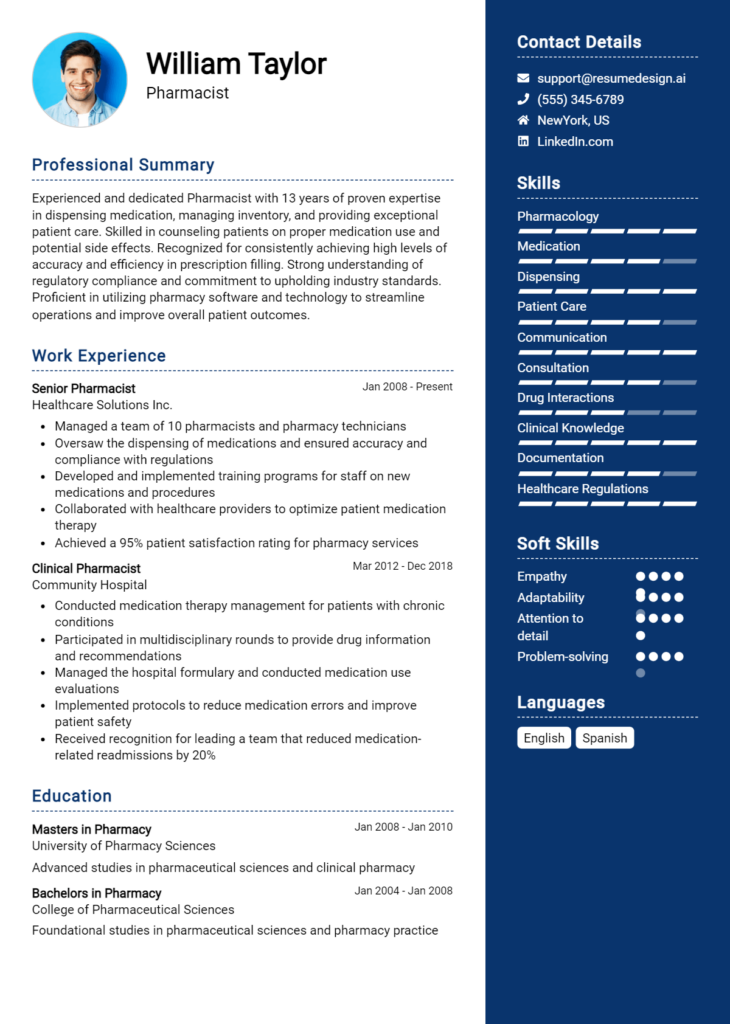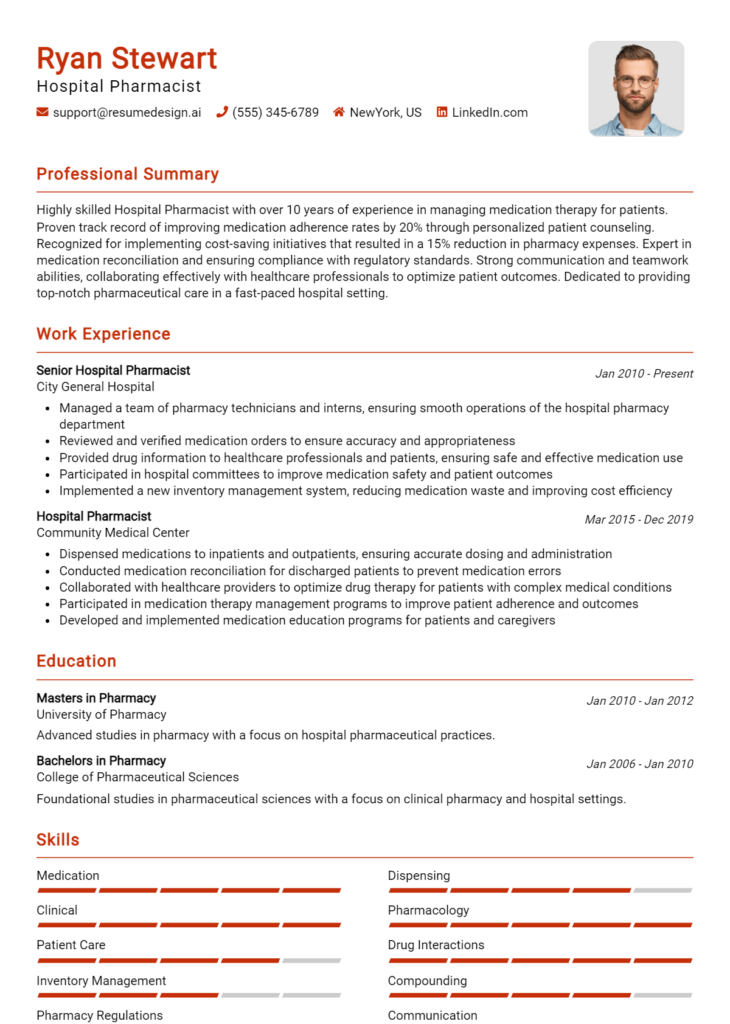Pediatric Pharmacist Core Responsibilities
A Pediatric Pharmacist plays a crucial role in ensuring the safe and effective use of medications in children. Key responsibilities include collaborating with healthcare teams to optimize medication therapy, counseling families on proper medication administration, and monitoring patient outcomes. Strong technical knowledge, operational efficiency, and problem-solving skills are essential for success, as they help bridge communication between departments like pediatrics, nursing, and pharmacy. A well-structured resume can effectively highlight these qualifications, contributing to the organization’s overall goals of providing exceptional patient care.
Common Responsibilities Listed on Pediatric Pharmacist Resume
- Reviewing and interpreting medication orders for pediatric patients
- Providing drug information and recommendations to healthcare providers
- Monitoring patient medication therapy for efficacy and safety
- Compounding and dispensing medications tailored for pediatric needs
- Educating families on medication management and potential side effects
- Collaborating with multidisciplinary teams to develop treatment plans
- Conducting medication reconciliation during patient admissions and discharges
- Participating in quality assurance and medication safety initiatives
- Staying updated with pediatric pharmacotherapy guidelines and regulations
- Training pharmacy staff and students on pediatric medication practices
- Participating in clinical research and trials related to pediatric medications
High-Level Resume Tips for Pediatric Pharmacist Professionals
A well-crafted resume is essential for Pediatric Pharmacist professionals, serving as the critical first impression that candidates make on potential employers. In the competitive field of pediatric pharmacy, your resume must not only showcase your clinical expertise and relevant experience but also reflect your unique achievements and contributions to patient care. A strong resume can set you apart from other candidates, making it vital to present your skills in a compelling way. This guide will provide practical and actionable resume tips specifically tailored for Pediatric Pharmacist professionals, helping you to create a document that truly represents your qualifications and passion for pediatric care.
Top Resume Tips for Pediatric Pharmacist Professionals
- Tailor your resume to the specific job description by incorporating relevant keywords and phrases that align with the position.
- Highlight your experience in pediatric pharmacy, including any specialized training or certifications that demonstrate your expertise.
- Quantify your achievements by including metrics or outcomes, such as improved patient adherence rates or successful medication management programs.
- Showcase your knowledge of pediatric pharmacotherapy and your ability to make medication recommendations tailored to children’s unique needs.
- Include any collaborative efforts with healthcare teams, demonstrating your ability to work effectively in multidisciplinary environments.
- List relevant software proficiency, such as pharmacy management systems and electronic health records, to emphasize your technical skills.
- Highlight any involvement in research, publications, or presentations that showcase your commitment to advancing pediatric pharmacy practice.
- Utilize a clean and professional format to enhance readability, ensuring that key information stands out to hiring managers.
- Incorporate a summary statement at the beginning of your resume that encapsulates your passion for pediatric pharmacy and your career objectives.
By implementing these tips, Pediatric Pharmacist professionals can significantly enhance their resumes, increasing their chances of landing a job in the field. A well-structured and targeted resume not only highlights your qualifications but also communicates your dedication to improving the health outcomes of children, making you a standout candidate in a competitive job market.
Why Resume Headlines & Titles are Important for Pediatric Pharmacist
In the competitive field of pediatric pharmacy, a well-crafted resume headline or title serves as a crucial first impression for potential employers. It acts as a powerful summary of a candidate’s key qualifications, encapsulating their skills, experience, and unique value in just a few impactful words. A strong headline can immediately grab the attention of hiring managers, making them more likely to delve deeper into the resume. Therefore, it is essential that this headline is concise, relevant, and directly related to the job being applied for, effectively showcasing the candidate's expertise in pediatric pharmacotherapy.
Best Practices for Crafting Resume Headlines for Pediatric Pharmacist
- Keep it concise – Aim for a headline that is brief yet informative.
- Be role-specific – Clearly indicate your expertise in pediatric pharmacy.
- Highlight key qualifications – Include phrases that showcase your most relevant skills and experience.
- Use action-oriented language – Employ active verbs to convey a sense of achievement and initiative.
- Incorporate industry keywords – Use terminology that is familiar in the pediatric pharmacy field to enhance visibility.
- Showcase unique selling points – Identify what sets you apart from other candidates.
- Avoid jargon – Ensure that your headline is easily understandable to someone outside your immediate field.
- Tailor for the position – Customize your headline for each job application to reflect the specific requirements of the role.
Example Resume Headlines for Pediatric Pharmacist
Strong Resume Headlines
Pediatric Pharmacist with 5+ Years of Experience in Pediatric Chemotherapy Management
Certified Pediatric Pharmacist Specializing in Medication Therapy Management for Children
Experienced Pediatric Pharmacist Dedicated to Enhancing Patient Outcomes Through Effective Medication Education
Weak Resume Headlines
Pharmacist Looking for a Job
Pediatric Pharmacy Professional
The strong headlines are effective because they provide specific information about the candidate's expertise and experience, making an immediate impact on hiring managers. They highlight qualifications and demonstrate a clear focus on the pediatric pharmacy field. In contrast, the weak headlines fail to impress due to their vagueness and lack of detail; they do not convey the unique strengths of the candidate or align with the expectations of the role, making them forgettable and less engaging.
Writing an Exceptional Pediatric Pharmacist Resume Summary
A well-crafted resume summary is crucial for a Pediatric Pharmacist as it serves as the first impression for hiring managers. In a competitive job market, a strong summary quickly captures attention by highlighting key skills, relevant experience, and notable accomplishments that demonstrate a candidate's qualifications for the role. This concise and impactful section should be tailored to the specific job the candidate is applying for, ensuring that it resonates with the unique demands of pediatric pharmacy practice and showcases the pharmacist's ability to contribute effectively to patient care.
Best Practices for Writing a Pediatric Pharmacist Resume Summary
- Quantify achievements whenever possible to provide concrete evidence of your impact.
- Focus on key skills relevant to pediatric pharmacy, such as medication management and patient counseling.
- Tailor your summary to align with the specific job description and requirements of the role.
- Use action verbs to convey a sense of proactivity and leadership in your practice.
- Highlight relevant certifications and training that enhance your qualifications.
- Keep it concise, ideally within 3-5 sentences, to maintain the reader's attention.
- Emphasize collaboration and communication skills, which are vital in a pediatric healthcare setting.
- Showcase your passion for pediatric care and commitment to improving patient outcomes.
Example Pediatric Pharmacist Resume Summaries
Strong Resume Summaries
Compassionate Pediatric Pharmacist with over 5 years of experience in optimizing medication therapy for children, achieving a 30% reduction in adverse drug reactions through meticulous monitoring and patient education. Proven track record in collaborating with interdisciplinary teams to enhance the overall healthcare experience for pediatric patients.
Detail-oriented Pediatric Pharmacist with a deep understanding of pediatric pharmacotherapy and a commitment to safe medication practices. Successfully implemented a medication reconciliation program that increased patient safety scores by 25% in a busy children’s hospital.
Dedicated Pediatric Pharmacist with expertise in managing complex medication regimens for children with chronic illnesses. Recognized for excellence in patient counseling, contributing to a 40% improvement in adherence rates among pediatric patients over the past year.
Weak Resume Summaries
Pharmacist with experience in a hospital setting looking for a new opportunity in pediatric pharmacy.
Enthusiastic about working with children and interested in a pharmacist role that focuses on pediatric care.
The strong resume summaries effectively highlight quantifiable achievements and specific skills relevant to pediatric pharmacy, demonstrating the candidates' impact in their roles. In contrast, the weak summaries lack detail and specificity, making them too generic and failing to convey the candidates' qualifications or contributions to pediatric care, which is vital for capturing the interest of hiring managers.
Work Experience Section for Pediatric Pharmacist Resume
The work experience section of a Pediatric Pharmacist resume is a critical component that significantly impacts the candidate's ability to stand out in a competitive job market. This section not only highlights the candidate's technical skills and knowledge in pharmacotherapy specific to pediatric populations but also emphasizes their capacity to manage teams effectively and deliver high-quality pharmaceutical care. By quantifying achievements and aligning past experiences with industry standards, candidates can demonstrate their impact on patient outcomes and operational efficiency, making them more attractive to potential employers.
Best Practices for Pediatric Pharmacist Work Experience
- Clearly outline specific responsibilities and roles held in previous positions.
- Quantify achievements using metrics such as patient outcomes, cost savings, or efficiency improvements.
- Highlight experience with pediatric medications and specialized knowledge in pharmacotherapy.
- Demonstrate collaboration with multidisciplinary teams to enhance patient care.
- Include any leadership roles held, emphasizing team management and mentoring.
- Align work experience with the latest industry standards and best practices.
- Utilize action verbs to convey a sense of proactivity and initiative.
- Tailor the experience section to reflect the specific job description and requirements.
Example Work Experiences for Pediatric Pharmacist
Strong Experiences
- Led a team of pharmacists in a pediatric unit, resulting in a 25% reduction in medication errors over one year through the implementation of a double-check system.
- Collaborated with pediatricians to develop a new protocol for the management of pediatric asthma, leading to a 30% increase in adherence to medication regimens.
- Managed the formulary review process for pediatric medications, successfully introducing five new medications that improved therapeutic outcomes for patients.
- Conducted educational sessions for nursing staff on pediatric pharmacotherapy, enhancing their understanding and compliance with medication administration protocols.
Weak Experiences
- Worked as a pharmacist in a hospital with children.
- Helped with medication management tasks.
- Participated in some team meetings related to pediatric care.
- Assisted in various pharmacy duties, including filling prescriptions.
The examples categorized as strong demonstrate clear, quantifiable outcomes and specific contributions to team efforts, showcasing the candidate's leadership and technical expertise. In contrast, the weak experiences lack detail and measurable impact, making it difficult for potential employers to assess the candidate's value and effectiveness in previous roles. Strong experiences provide a clearer narrative of the candidate's capabilities and their potential contributions to future employers in the pediatric pharmacy field.
Education and Certifications Section for Pediatric Pharmacist Resume
The Education and Certifications section of a Pediatric Pharmacist resume plays a critical role in establishing the candidate's qualifications and expertise in the field. This section showcases the academic background, industry-relevant certifications, and commitment to continuous education that are vital for ensuring safe and effective medication management in pediatric patients. By highlighting relevant coursework, specialized training, and certifications, candidates can enhance their credibility and demonstrate alignment with the specific demands of the Pediatric Pharmacist role.
Best Practices for Pediatric Pharmacist Education and Certifications
- Include relevant degrees, such as Doctor of Pharmacy (Pharm.D.) or Bachelor of Pharmacy (B.Pharm).
- List certifications like Board Certified Pediatric Pharmacy Specialist (BCPPS) to validate specialized knowledge.
- Highlight any advanced training or fellowships that focus on pediatric pharmacotherapy.
- Detail relevant coursework in pediatric pharmacology, therapeutics, or clinical pharmacy.
- Emphasize continuous learning through professional development courses or workshops.
- Use clear and concise language to ensure easy readability and understanding.
- Prioritize the most relevant and current credentials to the job role.
- Avoid listing outdated or irrelevant qualifications that do not pertain to pediatric pharmacy.
Example Education and Certifications for Pediatric Pharmacist
Strong Examples
- Doctor of Pharmacy (Pharm.D.), University of California, San Francisco
- Board Certified Pediatric Pharmacy Specialist (BCPPS), Pharmacy Certification Board
- Completed Pediatric Pharmacotherapy Residency, Children’s Hospital Los Angeles
- Relevant Coursework: Pediatric Pharmacology, Clinical Therapeutics in Pediatrics
Weak Examples
- Bachelor of Science in Biology, University of Southern California
- Certification in Basic Life Support (BLS), American Heart Association
- Completed a General Pharmacy Residency with no pediatric focus
- High School Diploma from Springfield High School
The examples provided are considered strong because they directly relate to the skills and knowledge necessary for a Pediatric Pharmacist, showcasing advanced education and specialized credentials that enhance the candidate’s expertise in pediatric care. In contrast, the weak examples lack relevance to the pediatric pharmacy field, highlighting outdated or general qualifications that do not support the specific requirements of the role.
Top Skills & Keywords for Pediatric Pharmacist Resume
As a Pediatric Pharmacist, possessing a diverse set of skills is crucial for delivering optimal pharmaceutical care to children. The role requires not only a deep understanding of pharmacology and medication management but also the ability to communicate effectively with both young patients and their caregivers. A well-crafted resume that highlights relevant skills can significantly enhance your chances of securing a position in this specialized field. By showcasing your expertise, you demonstrate your readiness to handle the complexities of pediatric medication therapy and your commitment to improving health outcomes for children.
Top Hard & Soft Skills for Pediatric Pharmacist
Soft Skills
- Empathy and Compassion
- Effective Communication
- Active Listening
- Problem-Solving
- Attention to Detail
- Team Collaboration
- Adaptability
- Patient Education
- Time Management
- Critical Thinking
- Interpersonal Skills
- Cultural Competency
- Conflict Resolution
Hard Skills
- Pediatric Pharmacotherapy
- Drug Utilization Review
- Dosing Calculations for Children
- Pharmacokinetics and Pharmacodynamics
- Medication Safety and Error Prevention
- Knowledge of Pediatric Formulations
- Therapeutic Drug Monitoring
- Familiarity with Pediatric Disease States
- Regulatory Compliance (e.g., FDA guidelines)
- Inventory Management
- Clinical Decision Support Systems
- Electronic Health Records (EHR) Proficiency
- Patient Counseling Techniques
- Research and Clinical Trials Awareness
For further insights into how to effectively present your skills and work experience, explore additional resources that can help you create an impressive resume tailored to the role of a Pediatric Pharmacist. For a more detailed understanding of essential skills needed in this profession, consider reviewing specialized literature and training programs.
Stand Out with a Winning Pediatric Pharmacist Cover Letter
I am excited to apply for the Pediatric Pharmacist position at [Hospital/Pharmacy Name] as advertised. With a Doctor of Pharmacy degree and over five years of experience in pediatric pharmacy, I have developed a strong foundation in the unique medication needs of children. My passion for improving pediatric health outcomes drives my commitment to providing exceptional pharmaceutical care and counseling to both patients and their families.
In my current role at [Current Employer], I collaborate closely with pediatricians and nursing staff to optimize medication therapy for children with various conditions, from asthma to complex chronic illnesses. I take pride in my ability to communicate effectively with both healthcare professionals and patients, ensuring that families feel informed and confident in their medication regimens. My experience in conducting medication therapy management and patient education initiatives has resulted in improved adherence and reduced hospital readmission rates in our pediatric population.
I am particularly drawn to [Hospital/Pharmacy Name] because of your commitment to innovative pediatric care and your emphasis on family-centered practices. I am eager to contribute to your team by utilizing my clinical skills and experience in formulary management, drug utilization reviews, and protocol development to enhance patient safety and therapeutic outcomes. I am also enthusiastic about participating in research initiatives that explore new pediatric treatment options and contribute to evidence-based practice in this specialized field.
Thank you for considering my application. I am looking forward to the opportunity to further discuss how my background and passion for pediatric pharmacy can contribute to the exceptional care provided at [Hospital/Pharmacy Name]. I am excited about the prospect of joining your dedicated team and supporting the health and well-being of our youngest patients.
Common Mistakes to Avoid in a Pediatric Pharmacist Resume
When crafting a resume for a Pediatric Pharmacist position, it's crucial to present a professional document that highlights relevant skills and experiences. However, many applicants fall into common pitfalls that can undermine their chances of landing an interview. Understanding these mistakes can help you create a compelling resume that stands out in a competitive field.
Ignoring Specific Pediatric Experience: Failing to specify relevant experience with pediatric patients can lead to a resume that feels generic. Highlight your work with children, including internships or rotations that focused on pediatric care.
Lack of Tailoring: Sending out a one-size-fits-all resume is a missed opportunity. Customize your resume for each application by incorporating keywords and requirements from the job description.
Overloading with Technical Jargon: While it's important to demonstrate your knowledge, using excessive technical language can alienate readers. Aim for clarity and explain complex terms when necessary.
Neglecting Soft Skills: Pediatric pharmacists need strong communication and empathy skills. Omitting these soft skills can make your resume less appealing. Include examples that demonstrate your ability to work with children and their families.
Inconsistent Formatting: A poorly formatted resume can be distracting and unprofessional. Ensure consistency in font, size, and layout to make your resume easy to read and visually appealing.
Vague Job Descriptions: Providing vague descriptions of past roles can leave hiring managers confused about your contributions. Use specific metrics and achievements to clarify your impact in previous positions.
Omitting Continuing Education: The field of pharmacy is constantly evolving, especially in pediatrics. Not mentioning any continuing education, certifications, or professional development can signal a lack of commitment to staying current in the field.
Neglecting to Proofread: Spelling and grammatical errors can create a negative impression. Always proofread your resume multiple times and consider having someone else review it for clarity and errors.
Conclusion
As a Pediatric Pharmacist, you play a crucial role in ensuring the safe and effective use of medications for children. Your responsibilities include understanding the unique pharmacokinetics and pharmacodynamics in pediatric patients, collaborating with healthcare teams, and educating families about medication management. Continuous education and staying updated with the latest guidelines are vital to your practice.
To excel in this field, having a well-crafted resume that highlights your specialized skills, experiences, and qualifications is essential. Make sure your resume reflects the unique aspects of pediatric pharmacotherapy, as well as your commitment to patient safety and care.
Now is the time to review your Pediatric Pharmacist resume. Are you showcasing your relevant experiences and skills effectively? Consider utilizing available resources to enhance your application. Access resume templates for a polished look, use the resume builder for an easy and guided creation process, and check out resume examples for inspiration. Don’t forget to also explore cover letter templates to complement your resume. Take charge of your career advancement and make sure your application stands out!

